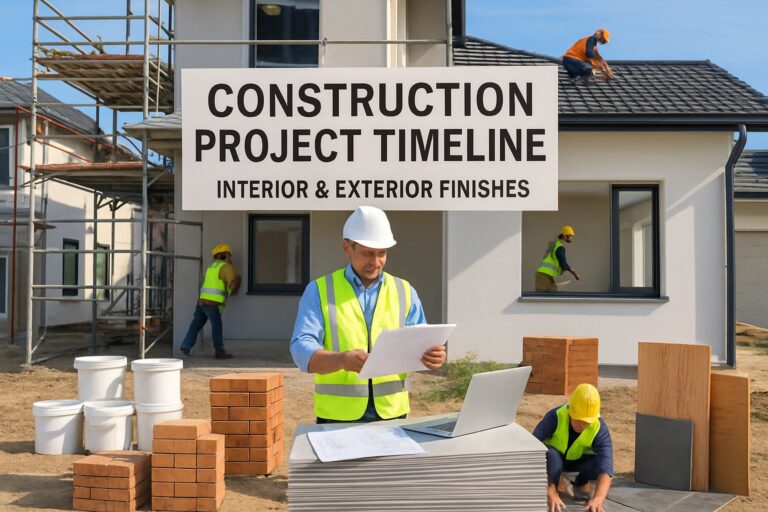Hiring the right general contractor can make or break your construction project. Many homeowners rush into decisions without proper research, leading to cost overruns, delays, and poor workmanship. The key to avoiding these problems is thorough vetting, clear contracts, and maintaining open communication throughout your project.
When it comes to Hiring the right General Contractor, ensure you understand the importance of due diligence and the impact it will have on your project’s success.

Hiring the right General Contractor involves more than just choosing someone who quotes a low price; it’s about finding a partner who aligns with your vision and needs.
Understanding the process of Hiring the right General Contractor can prevent costly mistakes and ensure your renovation runs smoothly.
The contractor hiring process can be fraught with potential pitfalls that turn your dream renovation into a nightmare. From accepting the lowest bid to skipping insurance verification, these mistakes can cost you thousands of dollars and months of frustration.
You have the power to protect yourself by learning what warning signs to watch for and which questions to ask. Understanding these common mistakes before you start your search will help you find a qualified professional who delivers quality work on time and within budget.
Key Takeaways
- Always verify licensing, insurance, and references before signing any contract with a general contractor
- Get multiple detailed bids and avoid automatically choosing the cheapest option without comparing quality and scope
- Establish clear payment schedules and maintain regular communication throughout the entire project timeline
Choosing the Right General Contractor
Don’t underestimate the importance of Hiring the right General Contractor for your next home improvement endeavor.
Finding the right general contractor requires checking their credentials, evaluating their professional background, and thoroughly researching their reputation through reviews and past work.
Vetting Credentials and Licenses
Hiring the Right General Contractor: Essential Considerations
Effective communication is key to Hiring the right General Contractor, as it sets the tone for your entire project.
Ensuring that you are Hiring the right General Contractor means verifying their credentials and checking their past project history.
When Hiring the right General Contractor, always remember to ask for references and follow up on them thoroughly.
Check that your general contractor has proper licensing for your state and project type. Unlicensed contractors pose serious risks to your safety and wallet.
Ask to see their license number and verify it with your state’s licensing board. Each state has different requirements, so make sure their credentials match your location.
Insurance is equally important. Request proof of:
- General liability insurance
- Workers’ compensation coverage
- Bonding (if required in your area)
Never hire a contractor without proper insurance. If someone gets hurt on your property or damage occurs, you could face expensive lawsuits.
Get copies of all insurance certificates and call the insurance company to confirm coverage is active. Some contractors let their policies lapse between jobs.
Part of Hiring the right General Contractor is ensuring they have the right insurance coverage to protect you.
Evaluating Experience and Professionalism
Look for contractors with solid experience in projects similar to yours. A bathroom remodeling expert might not be the best choice for a kitchen addition.
Ask how long they’ve been in business and request examples of recent similar projects. Established businesses show stability and commitment to their local market.
Professional contractors maintain business phone lines and emails rather than using personal accounts. They should also have a physical office address you can visit.
Budgeting accurately is essential when Hiring the right General Contractor, as this can affect the entire project scope.
Pay attention to their communication style during initial meetings. Do they return calls promptly? Do they ask detailed questions about your project? Good communication now means fewer problems later.
Watch for red flags like contractors who:
- Show up without appointments
- Pressure you to sign immediately
- Only accept cash payments
- Have completely empty schedules
Researching Online Reviews and Previous Projects
Check multiple review platforms including Google, Better Business Bureau, and local home improvement sites. Look for patterns in feedback rather than focusing on single complaints.
Read both positive and negative reviews carefully. Notice how the contractor responds to criticism. Professional responses to complaints show they care about customer satisfaction.
Ask for references from recent clients and actually call them. Most homeowners are happy to share their experiences, both good and bad.
Request to see photos of completed projects or visit current job sites if possible. This gives you a real sense of their work quality and organization.
Avoid relying solely on contractor matching services like HomeAdvisor or Angie’s List. These platforms charge contractors for leads, which can increase your project costs.
Verify online reviews are genuine by checking reviewer profiles and looking for detailed, specific feedback rather than vague praise.
Gathering and Comparing Multiple Bids
Getting at least three bids from different contractors helps you identify fair pricing and avoid being overcharged. Comparing bids properly requires looking beyond just the bottom line price to understand what work is actually included in each proposal.
Requesting Detailed Proposals
Ask each contractor to provide a standardized bid form that breaks down all major work areas. This makes it easier to compare what each contractor is including in their price.
Request line items for foundations, framing, electrical, plumbing, and finishing work. Each contractor should specify materials, labor costs, and timeline estimates separately.
Make sure contractors address the complete project scope in their proposals. Missing items like permits, cleanup, or specialty work can lead to expensive surprises later.
Ask for references and proof of insurance with each bid. This helps you verify that contractors can actually deliver what they promise at their quoted price.
Spotting Red Flags in Low Bids
Unusually low estimates often signal poor-quality materials, inexperienced labor, or hidden costs that may arise later. If one bid is 15% or more below others, investigate carefully.
Look for missing allowances in low bids. Contractors might exclude building automation, casework installation, or temporary utilities to make their price seem lower.
Clear contracts are crucial for Hiring the right General Contractor and ensuring all expectations are documented.
Check if the low bidder has included all required scope of work. Some contractors leave out expensive items assuming someone else will handle them.
Common missing items in low bids:
- Site preparation and cleanup
- Permits and inspections
- Specialty subcontractor work
- Material delivery and storage
- Temporary utilities and facilities
Ask the low bidder to clarify their pricing and explain any assumptions they made about the project scope.
Clarifying Project Scope and Costs
Create a comparison matrix that lists all major work categories across each bidder. This side-by-side view helps you spot discrepancies and missing items quickly.
Contact contractors directly when their bids seem unclear or incomplete. Most contractors will gladly explain their assumptions or provide revised pricing based on clearer expectations.
Verify that each contractor understands the same scope of work. Different interpretations of your project requirements can lead to vastly different pricing and results.
Document all clarifications in writing before making your final decision. This prevents misunderstandings about what work is included in the contracted price.
Key questions to ask contractors:
- What materials and brands are included?
- Are permits and inspections covered?
- What happens if unexpected issues arise?
- How do you handle change orders?
Checking References and Past Performance
Thorough reference checks reveal a contractor’s true work quality and reliability. Direct contact with previous clients and physical inspection of completed projects provide the most accurate picture of what to expect.
Contacting References for Insight
Ask contractors for at least three recent references from projects similar to yours in scope and budget. Contact each reference by phone rather than email to gauge their tone and get honest feedback.
Focus on specific performance metrics during your calls. Ask about project timeline adherence, budget accuracy, and quality of workmanship. Reference checking questions should cover communication skills and problem-solving abilities.
Key questions to ask include:
- Did the contractor complete work on time and within budget?
- How did they handle unexpected issues or changes?
- Would you hire them again for future projects?
- Were permits and inspections handled properly?
Pay attention to any hesitation in responses. References who struggle to provide positive feedback may indicate potential problems.
Document all reference conversations with dates and key points discussed. This creates a record for comparison between contractors.
Visited Completed Projects
Request to visit 2-3 recently completed projects that match your job type. Quality contractors will readily provide addresses and coordinate visits with homeowners.
Examine workmanship details closely during site visits. Look for straight lines, proper joints, consistent finishes, and professional installation methods. Poor craftsmanship becomes obvious when viewed in person.
Ask homeowners about their experience beyond the visible work:
- Cleanliness and job site organization
- Adherence to work schedules
- Crew professionalism and behavior
- Cleanup and final walk-through process
Take photos of quality details that impress you. These serve as examples to discuss with your potential contractor about expectations for your project.
Compare multiple completed projects to identify consistency in work quality. A contractor should demonstrate similar standards across different job sites and timeframes.
Establishing a Clear and Comprehensive Written Agreement

A detailed written contract protects both you and your contractor by setting exact expectations for work quality, timelines, and payment terms. Clear milestone definitions and warranty provisions prevent disputes and ensure project success.
Defining Scope of Work and Project Timeline
Your scope of work must list every task the contractor will complete. Include specific materials, brands, and quality standards. Don’t accept vague terms like “quality materials” or “standard installation.”
Write down room-by-room details for renovation projects. For example, specify “install 12-inch ceramic tiles in kitchen and bathroom” instead of “tile work.” This prevents contractors from using cheaper alternatives.
Your project timeline should include start dates, completion dates, and major phases. Break large projects into weekly segments. A kitchen renovation might look like:
- Week 1: Demolition and electrical rough-in
- Week 2: Plumbing and drywall installation
- Week 3: Flooring and cabinet installation
- Week 4: Final fixtures and cleanup
Weather delays and permit issues can affect outdoor projects. Add buffer time for these common delays. Include penalties for missed deadlines without valid reasons.
Avoiding common contract drafting pitfalls helps prevent misunderstandings that lead to project delays and cost overruns.
Setting Milestones and Payment Schedule
Never pay large amounts upfront. Structure your payment schedule around completed work milestones. A typical schedule might be:
| Milestone | Payment Amount | Work Completed |
|---|---|---|
| Contract signing | 10% | Materials ordered |
| Foundation/framing | 25% | Structural work done |
| Rough-in complete | 25% | Electrical/plumbing installed |
| Finish work | 25% | Flooring, painting done |
| Final inspection | 15% | All work completed |
Milestones should be measurable and specific. “Plumbing rough-in complete and inspected” is better than “plumbing work done.” This gives you clear checkpoints to evaluate progress.
Hold back the final payment until you complete a walk-through inspection. This ensures the contractor fixes any problems before leaving the job site.
Link payments to permit approvals and inspections. Don’t release milestone payments until work passes required inspections from local authorities.
Including Warranty Information and Payment Terms
Your warranty information should specify what’s covered and for how long. Workmanship warranties typically last one to two years. Material warranties may be longer but come from manufacturers, not contractors.
Get separate warranties for different work types:
- Roofing: 10-25 years for materials, 2-5 years for installation
- HVAC: 1 year installation, manufacturer warranty on equipment
- Electrical: 1-2 years on all wiring and fixtures
Payment terms must include accepted payment methods and due dates. Specify whether you’ll pay by check, credit card, or bank transfer. Include late payment penalties if the contractor requests them.
Add change order procedures to your contract. Any work additions or modifications need written approval with updated costs and timelines. This prevents surprise charges at project completion.
Drafting agreements that hold up in court requires specific language about warranties, payments, and dispute resolution procedures.
Include lien waiver requirements. Contractors should provide proof that subcontractors and suppliers are paid before receiving final payment from you.
Managing Payments and Financial Arrangements

Smart payment planning protects you from contractor fraud and project delays. Never pay large amounts upfront, and always tie payments to completed work milestones.
Avoiding Large Upfront Payments
Contractors who ask for big upfront payments often create red flags. Legitimate contractors rarely need more than 10-15% down to start your project.
Safe upfront payment amounts:
- Small projects (under $10,000): $500-$1,000 maximum
- Medium projects ($10,000-$50,000): 10% of total cost
- Large projects (over $50,000): 5-10% of total cost
Many contractor payment mistakes happen when homeowners pay too much too early. This leaves you with little control if problems arise.
By Hiring the right General Contractor, you ensure your project is completed not just on time, but also to your standards.
Be especially careful of contractors who demand payment for materials upfront. Established contractors have accounts with suppliers and don’t need your money first.
If a contractor disappears after taking a large payment, recovering your money becomes very difficult. Keep most of your payment power until work is complete.
Arranging Payments by Project Milestones
Payment schedules should match actual work progress, not calendar dates. Tie each payment to specific completed tasks you can see and verify.
Example milestone payment schedule:
Finally, Hiring the right General Contractor is about building a partnership that results in a successful project.
- 10% at contract signing
- 25% after materials arrive and prep work finishes
- 25% at project halfway point
- 25% when work is substantially complete
- 15% after final walkthrough and approval
Contractual payment management works best when milestones are clear and measurable. Write specific descriptions like “after kitchen cabinets are installed and functional” instead of vague terms like “halfway done.”
Never pay for work you cannot see or verify. Walk through each milestone with your contractor before releasing payment.
Keep your final payment at least 10-15% of the total project cost. This gives you leverage to ensure all punch list items get completed properly.
Ensuring Compliance with Regulations and Legalities
Your contractor must hold valid permits and understand all applicable building codes before starting work. Ensuring compliance with laws and regulations helps you avoid costly penalties and project delays.
Verifying Building Codes and Permits
Ask your contractor to provide copies of all required permits before work begins. Valid permits show the project meets local safety standards and zoning requirements.
Key permits to verify:
Make sure you take the time needed when Hiring the right General Contractor to find the best fit for your project.
- Building permits for structural changes
- Electrical permits for wiring work
- Plumbing permits for water and sewer connections
- Mechanical permits for HVAC systems
Check permit numbers against your city’s online database. Many municipalities allow you to search active permits by address or permit number.
Your contractor should explain which codes apply to your project. Building codes cover structural requirements, fire safety, and accessibility standards. These rules change frequently, so contractors must stay current.
A good relationship with your contractor starts with Hiring the right General Contractor who communicates well.
Ultimately, Hiring the right General Contractor can save you time, money, and a lot of frustration.
Request documentation showing the contractor’s familiarity with relevant codes. Experienced contractors can cite specific code sections that affect your project.
Understanding Local and State Regulations
Always clarify the scope of work when Hiring the right General Contractor to avoid misunderstandings and extra costs.
It’s essential to keep the lines of communication open when Hiring the right General Contractor to ensure project success.
Local regulations vary significantly between cities and counties. Your contractor must understand zoning laws, setback requirements, and height restrictions in your area.
Common local regulations include:
- Fence height limits
- Driveway placement rules
- Tree removal restrictions
- Noise ordinances during construction
State regulations often cover licensing requirements and worker safety standards. Verify your contractor holds current state licenses for their trade.
Construction companies must navigate complex regulatory compliance across multiple jurisdictions. Ask how they stay updated on changing rules.
Some areas have historic district requirements or environmental protections. Your contractor should identify these restrictions early in the planning process.
Request references from recent projects in your city. This shows the contractor successfully navigated local approval processes.
Monitoring Progress and Maintaining Communication
Clear communication channels and regular progress updates prevent costly misunderstandings and keep your project on track. Proper documentation of changes protects both you and your contractor from disputes.
Setting Expectations for Updates
Establish a regular communication schedule before work begins. Weekly progress meetings work well for most projects, but daily check-ins may be needed for complex jobs.
Define your preferred communication methods:
- Phone calls for urgent issues
- Email for documentation
- Text messages for quick updates
- In-person meetings for major decisions
Request specific information in each update. Your contractor should report completed tasks, upcoming work, and any potential delays.
Set clear response times for both parties. You might expect responses within 24 hours for non-urgent matters and within 2 hours for project-stopping issues.
Ask for photo documentation of progress. Pictures help you track work quality and provide records for insurance or warranty claims.
Documenting Changes and Change Orders
All project changes require written documentation. Verbal agreements lead to disputes and cost overruns.
Create a formal change order process that includes:
- Detailed description of the change
- Cost breakdown for materials and labor
- Timeline impact on project completion
- Your written approval signature
Review each change order carefully before signing. Managing a contractor’s performance effectively requires clear expectations and proper documentation.
Keep copies of all change orders in a project file. This documentation protects you if disagreements arise about scope or pricing.
Never allow work to proceed on changes without signed approval. This prevents surprise bills and keeps you in control of project costs.
Addressing Issues Promptly
Contact your contractor immediately when problems arise. Quick communication prevents small issues from becoming major headaches.
Common issues that need prompt attention:
- Work quality below standards
- Missed deadlines or schedule delays
- Unexpected site conditions
- Safety concerns
- Budget overruns
Document all problem discussions in writing. Send follow-up emails summarizing phone conversations and agreed-upon solutions.
Set deadlines for issue resolution. Give your contractor reasonable time to fix problems, but establish clear expectations for when corrections must be completed.
Know when to escalate serious issues. Contact licensing boards or legal counsel if your contractor becomes unresponsive or refuses to address legitimate concerns.
Coordinating Subcontractors and Project Oversight
Good general contractors act as project managers who coordinate all the moving parts of your construction project. They handle scheduling conflicts between different trades and maintain quality control standards throughout your home improvement project.
Understanding the Role of Subcontractors
Subcontractors perform specialized work that your general contractor cannot do alone. Plumbers handle water lines. Electricians install wiring. HVAC technicians set up heating and cooling systems.
Most construction projects need multiple subcontractors working in sequence. Your renovation project might require foundation specialists first, then framers, followed by electrical and plumbing crews.
Effective subcontractor management aligns efforts of various disciplines and ensures all trades work together smoothly. Each subcontractor brings specific skills to your home improvement project.
Common subcontractor types include:
- Electrical contractors
- Plumbing specialists
- HVAC technicians
- Flooring installers
- Painters and finishers
- Roofing contractors
The timing matters greatly. Electrical work must happen before drywall installation. Flooring comes after painting. Your general contractor coordinates these sequences.
Ensuring the General Contractor Manages All Parties
Your general contractor should handle all communication with subcontractors. You should not need to contact individual trades directly about problems or changes.
Establishing clear communication channels between the general contractor and subcontractors ensures information flows properly. Your contractor must provide timely updates about schedule changes or project developments.
Key management responsibilities include:
- Daily coordination meetings
- Quality inspections of subcontractor work
- Schedule conflict resolution
- Payment processing and oversight
- Safety compliance monitoring
Good contractors implement regular inspections and continuous monitoring throughout your home improvement project. This prevents quality issues from becoming expensive problems later.
Ask how your contractor plans to coordinate different trades. They should explain their scheduling process and quality control measures. Technology platforms can provide real-time updates and keep everyone informed about project changes.
Your contractor must also handle any conflicts between subcontractors. This includes resolving disputes about work quality, scheduling delays, or site access issues.
Frequently Asked Questions
Homeowners often have specific concerns about contractor selection, communication, and contract terms. These questions address the most critical aspects of the hiring process and project management.
What should I look out for when reviewing a general contractor’s past work?
Ask to see photos of completed projects that match your renovation type. Kitchen remodels require different skills than bathroom renovations or additions.
Request contact information for at least three recent clients. Call them directly to ask about work quality, timeline adherence, and communication style.
Visit active job sites if possible. This shows you how the contractor manages work areas, treats materials, and interacts with their crew.
Look for consistent quality across different project types. A contractor who does excellent deck work might not be skilled at interior renovations.
Check if past projects required permits and inspections. This indicates the contractor follows proper building codes and regulations.
How can I effectively communicate my project expectations to a contractor?
Create a detailed written list of your project goals before meeting contractors. Include specific materials, finishes, and timeline requirements.
Provide visual references like photos, magazine clippings, or online inspiration boards. These help contractors understand your style preferences clearly.
Discuss your budget range upfront. This prevents wasted time on proposals that exceed your financial limits.
Ask contractors to repeat back your requirements during initial meetings. This confirms they understand your project scope correctly.
Request regular progress updates at specific intervals. Weekly check-ins work well for most home renovation projects.
What are the best practices for verifying a contractor’s credentials and insurance?
Contact your state’s licensing board to verify the contractor’s license status. Most states maintain online databases for easy verification.
Request current certificates for both general liability and workers’ compensation insurance. Call the insurance companies directly to confirm coverage remains active.
Check with the Better Business Bureau for complaint history and resolution records. Look for patterns in customer complaints rather than isolated incidents.
Verify the contractor has proper bonding if your project requires it. Bonding protects you if the contractor fails to complete work or pay suppliers.
Ask for proof of any specialty certifications relevant to your project. Electrical or plumbing work often requires additional licensing.
What steps should I take to ensure a clear and fair contract with a general contractor?
Read every contract section carefully before signing. Never rely on handshake agreements alone for legal protection.
Ensure the contract includes specific materials, brands, and quality grades. Vague descriptions lead to disputes about final results.
Include a detailed timeline with milestone dates and completion deadlines. Add penalty clauses for significant delays without valid reasons.
Specify a payment schedule tied to work completion rather than calendar dates. Never pay large amounts upfront before work begins.
Include change order procedures for project modifications. Both parties should agree to pricing and timeline impacts in writing.
How can I maintain a good working relationship with a contractor throughout the project?
Respect the contractor’s work schedule and crew routines. Frequent interruptions can slow progress and increase frustration levels.
Address concerns promptly through your designated project contact person. Avoid giving instructions directly to crew members without contractor approval.
Keep pets and children away from active work areas for safety reasons. This also allows crews to work efficiently without distractions.
Pay invoices according to your agreed schedule once work milestones are completed satisfactorily. Prompt payment builds trust and goodwill.
Document any issues with photos and written descriptions. Share these with your contractor immediately rather than waiting for problems to compound.
What are the signs that I should be cautious of when a contractor provides an estimate?
Be wary of estimates that seem significantly lower than others you’ve received. Extremely cheap bids often indicate poor quality work or hidden costs.
Question contractors who provide verbal estimates only. Professional contractors should provide detailed written proposals for review.
Avoid contractors who demand full payment upfront or request unusually large deposits. Standard practice involves smaller payments tied to work progress.
Be cautious of door-to-door contractors or those with completely open schedules. Quality contractors typically have some backlog of scheduled work.
Watch for contractors who cannot provide local references or physical business addresses. This might indicate fly-by-night operations that could disappear mid-project.
Be prepared to ask the right questions during your consultation as part of Hiring the right General Contractor.
Understanding the timeline and what to expect from your contractor is key to Hiring the right General Contractor.
To ensure quality work, focus on Hiring the right General Contractor who stands behind their work with a solid warranty.
Your decision in Hiring the right General Contractor can significantly influence the outcome of your project.







